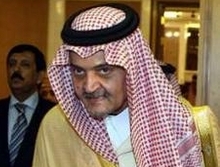 Saudi Arabia has abandoned efforts to mediate in Lebanon’s political crisis after Hezbollah quit the government last week.
Saudi Arabia has abandoned efforts to mediate in Lebanon’s political crisis after Hezbollah quit the government last week.
Saud al-Faisal, Saudi Arabia’s foreign minister, told the Saudi-owned Al-Arabiya TV in an interview on Wednesday that the Saudi king is “withdrawing his hand” from Lebanon.
Lebanon is enduring a political crisis stemming from a UN court investigating the assassination of Rafik Hariri, former Lebanese prime minister.
Asked about the situation in Lebanon, al-Faisal said that “It’s dangerous, particularly if it reaches separatism or the division of Lebanon. This would mean the end of Lebanon as a model of peaceful coexistence between religions and ethnicities and different factions.”
The foreign minister said that Saudi’s King Abdullah and Bashar al-Assad, the Syrian president, had been in contact to help “end the whole Lebanon problem.”
“When that did not happen, the custodian of the holy mosques [King Abdullah] said he was pulling his hand out” from the effort, Prince Saud was quoted as saying.
Al Jazeera’s Zeina Khodr reported from Beirut that “it is being described as a dangerous development. Saudi Arabia is a major political power here, and it holds political sway.
“While Saudi Arabia may have decided to pull out, Qatar and Turkey are pushing forward, meeting leaders in Lebanon and Syria, which is a major supporter of the opposition,” our correspondent said.
“There are fears that political tensions could spill over to streets.”
Sheikh Hamad bin Jassim Al Thani, the Qatari prime minister, and Ahmet Davutoglu, the Turkish foreign minister, met with Saad Hariri, the son of the slain leader, who is staying on as a caretaker prime minister.
The officials also met with Sayyed Hassan Nasrallah, Hezbollah’s leader.
According to Lebanon’s power-sharing system, the president must be a Christian Maronite, the prime minister a Sunni and the parliament speaker a Shia.
Each faith makes up about a third of Lebanon’s population of four million.
Hariri, a Sunni, is backed by Western powers, including the United States, while Hezbollah is supported by Iran and by neighbouring Syria.
In May 2008, armed supporters of Hezbollah took over parts of Beirut after government shut down its private telecommunications network and stepped up its control at the airport.
Dozens of people were killed in fighting across the country.

Leave a Reply
You must be logged in to post a comment.